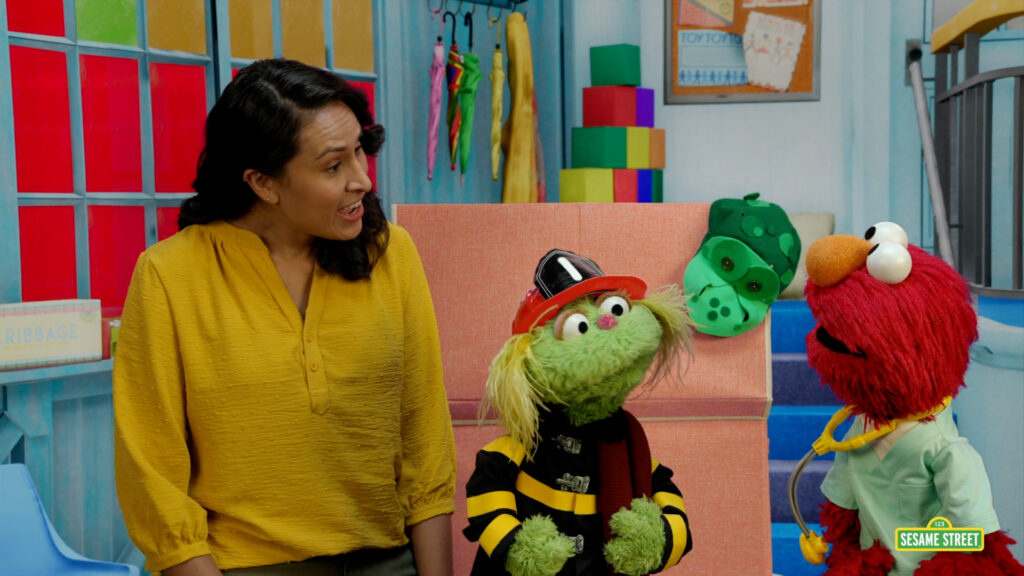Health
How Sesame Street Helps Children with Mental Health

WASHINGTON — When Elmo asked, “How’s everyone doing?” In January, he didn’t expect the onslaught of stress, despair and anxiety that plagued his answers.
“I’m just looking for someone to talk to and show me some love, if you know what I mean,” confessed singer T-Pain wrote back to the red Muppet.
“Elmo, I’m gonna be real, I’m at my limit,” another user wrote. Elmo’s tweet generated more than 100,000 responses.
The perpetually 3 1/2-year-old Muppet was a bit overwhelmed, but characteristically supportive, Sesame Workshop’s Jeanette Betancourt, senior vice president for U.S. Social Impact, told educators and therapists during a May presentation on mental health awareness in Rockville , Maryland. ., headquarters of the Substance Abuse and Mental Health Services Administration.
The “It’s OK to Not Be OK” symposium was one of the latest in a flurry of events, proposals and funding programs from the Biden administration to address the nation’s mental health and child welfare crisis. Sesame Street was a familiar environment for both federal officials and experts who attended the talk: the Department of Health and Human Services has long partnered with the Sesame Workshop to mental health resources for parents, children and even military families specifically.
Sesame Workshop told STAT this week that it is developing new tools to talk to children about parental substance use, including a digital course for caregivers. The organization is working with the Foundation for Opioid Response Efforts on the resources and aims to make them available early next year.
Elmo – and other Muppets, like Cookie Monster and even Oscar the Grouch – have long asked their young audiences about feelings and shared theirs. It’s part of a long-standing effort by Sesame Street to promote conversations about mental wellness, and makes Sesame a natural partner for others with similar goals.
“We generally call them big feelings… there are joyful big feelings, and there are also feelings that might be more challenging,” Betancourt told STAT after her presentation.
Over the past four years, Congress has appropriated billions in new funding for federal and state mental health resources. President Biden asked for billions more in his next budget.
But the flood of efforts and funds has not yielded tangible results. About 20% of American adults report living with a mental illness; more than half receive no treatments. The mental well-being of children does actually worsensaccording to federal data.
Psychology experts, government officials and lawmakers have attributed the trends, especially among children and teens, to a litany of factors: Covid-19 shutdowns, economic challenges and substance use among family members, and any stressors these factors place on young children. . Experts, including Surgeon General Vivek Murthy, also blame social media (but not Elmo, who he quickly reminded people was a old friend).
“Our friend Elmo is right: we need to be there for each other, offer our help to a neighbor in need, and above all, ask for help when we need it,” President Biden wrote after the Muppet thanked people for sharing their thoughts. feelings and promised to come back soon.
Federal officials are well aware that mental health trends are not yet changing.
“What we don’t know is whether that will decrease. So far, it doesn’t seem to be slowing down,” Anita Everett, director of SAMHSA’s Center for Mental Health Services, told STAT in May during a conversation with Betancourt.
Sesame Workshop has experience helping very young children with difficult topics. In 2019, the company introduced a green, frizzy-haired Muppet, Karli, who was in foster care due to her mother’s substance use issues. Elmo, who of course befriended the newcomer, had a conversation with his father Louie about what addiction means.
“Karli’s mother has a disease called addiction,” Louie explains. “Addiction makes people feel like they need an adult drink like alcohol or some other type of drug to feel good. That can cause someone to behave strangely, in a way that they cannot control.”
Karli’s story came about when Sesame looked at trends around foster care and the substance use crisis, Betancourt said.
“[We] try to make sure that we use our Muppets in a way that is not scary, but at the same time provides a scenario that is comforting,” said Betancourt.
“We do a lot of research into what is happening, where are the gaps? How do the media present different topics?” she said. In the years before Karli’s arrival, there was one steady increase among children under the age of six entering the child welfare system, with parental substance use cited as a major factor in their placement.
“We realized that to tell the full story and acknowledge these transitions, we need to really tell [out] which was a reality for many young children,” said Betancourt.
But while Karli and Elmo’s conversations about their big feelings are important in bringing words to young children going through similar experiences, Sesame Workshop and child psychologists agree that they are only the first step in ensuring mental well-being – and the having at least one stable caregiver when going home to have those conversations is the following.
“The content is great, but it’s all in the context of relationships,” says Meghan Schmelzer, senior manager of infant and young child mental health policy at the advocacy group Zero to Three.
And while the pandemic caused unrest, the government’s response also raised billions of dollars for efforts to support caregivers and increase child care resources, psychologists and advocates said.
“That was a time unlike anything we’ve ever seen in our history, in terms of recognizing that families need these resources and support,” Schmelzer said. “States had an astonishing amount of money – and had to use it in a short time.”
Those funds — largely coming from the American Rescue Plan through block grants — are now drying up just as other programs, such as the child tax credit, are set to expire, Schmelzer and others say. And issues that federal officials promised to address, such as labor shortages and psychiatric care bottlenecks, still persist.
“The problem is that many children have done the worst developmentally, and during the pandemic, it’s also the children who are under-resourced in so many different ways,” said Dipesh Navsaria, professor of pediatrics at the University of Wisconsin and medical director. of Reach Out and Read Wisconsin, an initiative to promote relationships between caregivers and children through storytelling. “That didn’t magically disappear with the end of the pandemic.”













